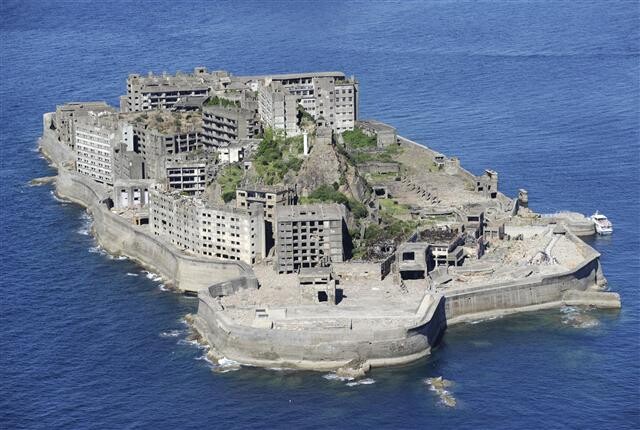hankyoreh
Links to other country sites 다른 나라 사이트 링크
S. Korea and Japan debate comments about being “forced to work”

No sooner did the UNESCO World Heritage Committee (WHC) agree to add Japanese forced labor facilities to its list of cultural heritages on July 5 than South Korea and Japan began squabbling over how to interpret comments about being “forced to work.” In both countries, people are criticizing the agreement as a diplomatic defeat.
“The remarks by the Japanese government representative did not mean ‘forced labor,’” Japanese Foreign Minister Fumio Kishida reportedly told the press while explaining the results of the negotiations on the evening of July 5, immediately after the committee meeting ended. Kishida’s remarks, which were quoted in Japanese newspapers on July 6, addressed Japanese UNESCO delegate Kuni Sato’s use of the expression “forced to work.”
In a temporary translation provided by the Japanese government that some Japanese papers made public, the English expression “forced to work” was translated as “ended up working.”
This is a different interpretation from the one offered the previous day by a South Korean government official who said that “this was basically the first time that the Japanese government officially admitted before the international community that Koreans had to work against their will during the Japanese occupation.”
Responding to the controversy, a South Korean government official said, “If you look at the larger context, it says that they were taken away against their will and ‘forced to work’ under harsh conditions. No matter how you look at it, the only interpretation is that this was forced labor.”
Indeed, Kishida’s suggestion that working against one’s will is not forced labor is being seen as contradictory.
Kishida’s motivation for rejecting the forced labor interpretation appears to be concerns that this could affect the issue of compensating Korean victims of forced labor.
On Monday, Kishida emphasized that “the position of the Japanese government continues to be that questions related to property claims between Japan and South Korea, including the issue of Koreans who allegedly were pressed into service, were settled once and for all when the two countries signed a treaty normalizing their diplomatic relations in 1965.”
“My understanding is that the South Korean government has no intention to use these remarks in the context of claims for damages against Japan. I confirmed this through high-level channels with the South Korean government,” Kishida added.
In their morning editions on July 6, Japanese newspapers provided neutral coverage of the process by which the two countries reached a compromise. The Yomiuri Shimbun, however, ran a sub-headline on its front page that said, “Japan appears to have basically given in to South Korea.” The Tokyo Shimbun also quoted a government source who said, “The facilities were added to the list, but we lost to South Korea diplomatically.”
There is also criticism of the agreement in South Korea. “The South Korean government is patting itself on the back for the diplomatic triumph of a single phrase about ’forced labor,‘” the Institute for Research in Collaborationist Activities observed.
“The South Korean government didn’t express its opposition to the registration of Shoin Jinja either, even though this private shrine was built by Yoshida Shoin, who advocated the conquest of Korea,” said Do Jong-hwan, lawmaker with the New Politics Alliance for Democracy (NPAD). “The government ought to have asked Japan to voluntarily retract its application for the seven facilities where forced labor occurred.”
After the committee’s 39th meeting on Sunday, the Chinese delegation, which was also in attendance, released a position statement. “Japan has yet to provide an adequate explanation about the overall facts concerning the use of forced labor. Japan needs to take steps to ensure that the pain suffered by all the individuals forced to work will be remembered and that their dignity will be protected,” the statement said.
By Gil Yun-hyung, Tokyo correspondent
Please direct questions or comments to [english@hani.co.kr]

Editorial・opinion
![[Column] Park Geun-hye déjà vu in Yoon Suk-yeol [Column] Park Geun-hye déjà vu in Yoon Suk-yeol](https://flexible.img.hani.co.kr/flexible/normal/500/300/imgdb/original/2024/0424/651713945113788.jpg) [Column] Park Geun-hye déjà vu in Yoon Suk-yeol
[Column] Park Geun-hye déjà vu in Yoon Suk-yeol![[Editorial] New weight of N. Korea’s nuclear threats makes dialogue all the more urgent [Editorial] New weight of N. Korea’s nuclear threats makes dialogue all the more urgent](https://flexible.img.hani.co.kr/flexible/normal/500/300/imgdb/original/2024/0424/7317139454662664.jpg) [Editorial] New weight of N. Korea’s nuclear threats makes dialogue all the more urgent
[Editorial] New weight of N. Korea’s nuclear threats makes dialogue all the more urgent- [Guest essay] The real reason Korea’s new right wants to dub Rhee a founding father
- [Column] ‘Choson’: Is it time we start referring to N. Korea in its own terms?
- [Editorial] Japan’s rewriting of history with Korea has gone too far
- [Column] The president’s questionable capacity for dialogue
- [Column] Are chaebol firms just pizza pies for families to divvy up as they please?
- [Column] Has Korea, too, crossed the Rubicon on China?
- [Correspondent’s column] In Japan’s alliance with US, echoes of its past alliances with UK
- [Editorial] Does Yoon think the Korean public is wrong?
Most viewed articles
- 1‘We must say no’: Seoul defense chief on Korean, USFK involvement in hypothetical Taiwan crisis
- 2N. Korean delegation’s trip to Iran shows how Pyongyang is leveraging ties with Moscow
- 3Amnesty notes ‘erosion’ of freedom of expression in Korea in annual human rights report
- 4[Column] Park Geun-hye déjà vu in Yoon Suk-yeol
- 5‘Weddingflation’ breaks the bank for Korean couples-to-be
- 6[Reportage] On US campuses, student risk arrest as they call for divestment from Israel
- 7[Editorial] New weight of N. Korea’s nuclear threats makes dialogue all the more urgent
- 8Why Korea shouldn’t welcome Japan’s newly beefed up defense cooperation with US
- 9[Guest essay] The real reason Korea’s new right wants to dub Rhee a founding father
- 10Will NewJeans end up collateral damage in internal feud at K-pop juggernaut Hybe?